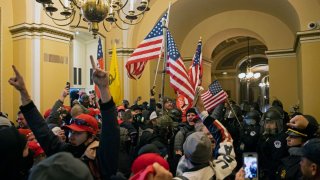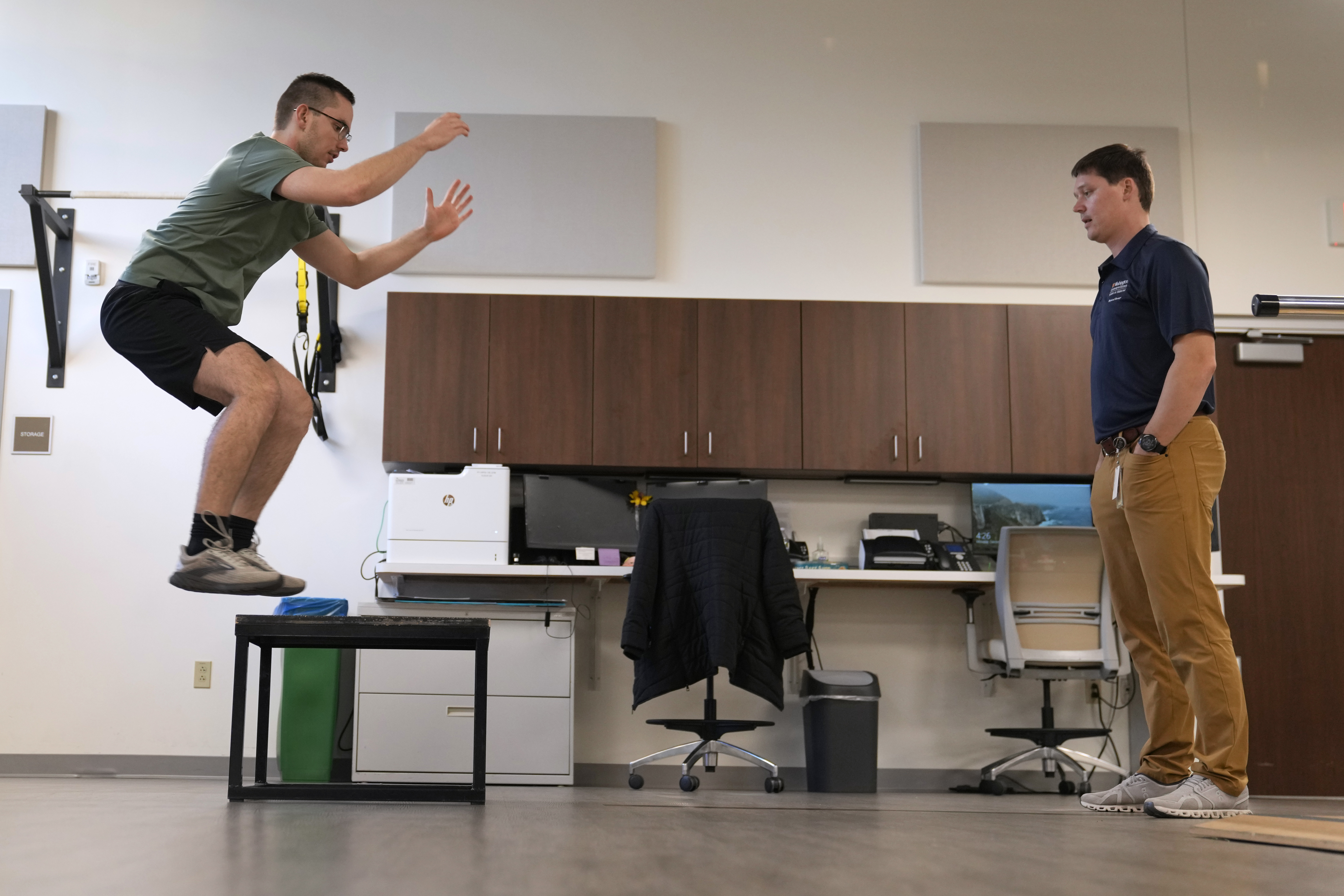
Over a year ago, two off-duty police officers from a small town in Virginia were charged with storming the U.S. Capitol together. One of them is heading to trial and faced a courtroom full of potential jurors on Monday. The other could be a key prosecution witness.
Jury selection is scheduled to resume Tuesday for the federal trial of former Rocky Mount police officer Thomas Robertson. The judge presiding over Robertson's trial questioned prospective jurors for several hours on Monday, the first day of jury selection.
Robertson's trial will be the third among hundreds of people charged in the Jan. 6, 2021, attack on the Capitol. The first two trials both ended with convictions, although one of those defendants was acquitted of a disorderly conduct charge.
One of Robertson’s former colleagues, Jacob Fracker, was scheduled to join him on trial in Washington, D.C., this week. Instead, Fracker reached a plea deal and agreed to cooperate with federal authorities.
Get Tri-state area news delivered to your inbox.> Sign up for NBC New York's News Headlines newsletter.
Fracker pleaded guilty last month to conspiring to obstruct an official proceeding, the joint session of Congress that convened Jan. 6 to certify President Joe Biden’s electoral victory. He is listed as a potential trial witness.
Robertson is charged with six counts, including obstruction of an official proceeding, civil disorder, entering and remaining in a restricted building and disorderly conduct in a Capitol building.
U.S. District Judge Christopher Cooper told prospective jurors that the trial could stretch into next week. The judge asked potential jurors if they have any direct or indirect connections to the events of Jan. 6 and if they could set aside any strong political beliefs to be fair and impartial. He disqualified a few members of the jury pool, including a man who was walking his dog near the Capitol on Jan. 6 and posted video of the riot on social media.
U.S. & World
“It was chaos,” the man said.
Robertson and Fracker both served as police officers in Rocky Mount, a town about 25 miles south of Roanoke with roughly 5,000 residents. The town fired both of them after their arrests.
Other former police officers are among the hundreds of people charged with joining the mob that stormed the Capitol.
Tam Dinh Pham, an off-duty Houston police officer on Jan. 6, was sentenced in December to 45 days imprisonment after pleading guilty to a riot-related misdemeanor. A trial is scheduled to start on April 25 for Thomas Webster, a retired New York City police officer charged with assaulting an officer at the Capitol. Former North Miami Beach police officer Nicholes Lentz, who also pleaded guilty to a riot-related misdemeanor, is scheduled to be sentenced May 10.
Robertson and Fracker drove with a neighbor to Washington on the morning of Jan. 6. A court filing in Fracker’s case says Robertson brought three gas masks for them to use. After listening to speeches near the Washington Monument, Fracker, Robertson and the neighbor walked toward the Capitol, donned the gas masks and joined the growing mob, the filing says.
Robertson was carrying a large wooden stick and used it to impede Metropolitan Police Department officers who arrived to help Capitol police officers hold off the mob, according to prosecutors. Robertson was photographed in the Capitol’s crypt making an obscene gesture in front of a statute of John Stark, an American general during the Revolutionary War, prosecutors said.
After the riot, Robertson posted a string of Facebook messages that were "illustrative of a sincere commitment to violence," prosecutors said. In a Jan. 8 post, Robertson wrote, “Being nice, polite, writing letters and sending emails hasn’t worked.”
“All thats left is violence and YOU and your ‘Friends on the other side of the isle’ have pushed Americans into that corner. The picture of Senators cowering on the floor with genuine fear on their faces is the most American thing I have seen in my life,” he wrote, according to prosecutors.
A Capitol police officer told Robertson he could enter the building but shouldn't go into any “restrictive areas,” defense attorney Mark Rollins said in a court filing last year. Robertson was inside the Capitol for only 10 minutes and didn't assault anybody or break anything, Rollins said.
Robertson was arrested a week after the riot and initially released from custody. But he has been jailed since Cooper ruled in July that he violated the terms of his pretrial release by possessing firearms.
Robertson ordered 34 guns before June 29, when FBI agents searched his home in Ferrum, Virginia. The judge rejected the former officer's suggestion that the firearms simply were World War II collectibles.
Robertson served in the U.S. Army before working as a police officer in Vinton, Virginia, according to Rollins. Robertson rejoined the Army in 2001 and was deployed to Iraq and Afghanistan, where he was wounded by gunshot and mortar shrapnel in 2011. Robertson underwent 10 surgeries before returning to the Rocky Mount Police Department and becoming a sergeant, according to his lawyer.
"He is a proud veteran with a love for his Country," Rollins wrote.
Robertson's trial will be the first for somebody accused of entering the Capitol building during the riot.
In the first Capitol riot trial, a jury convicted a Texas man of storming the Capitol with a holstered handgun. Guy Wesley Reffitt also was convicted on March 8 of obstructing Congress’ joint session to certify the Electoral College vote, interfering with police officers who were guarding the Capitol and threatening his two teenage children if they reported him to law enforcement.
In the second trial, a judge convicted Cowboys for Trump founder Couy Griffin, an elected official in New Mexico, of illegally entering restricted U.S. Capitol grounds. But the judge, who heard testimony without a jury, also acquitted Griffin of engaging in disorderly conduct.
Reffitt and Griffin entered restricted areas outside the Capitol but not the building itself.
Another Capitol riot trial is scheduled to start Tuesday for Matthew Martin, a federal contractor who held a top-secret security clearance while working for a defense contracting company at the National Laboratory in Los Alamos, New Mexico. The same judge who convicted Griffin is set to decide Martin's case.



